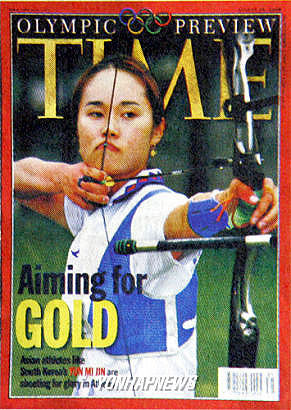The Good, the Bad, and the Ugly
 (Picture is not related to the article.)
(Picture is not related to the article.)The Good, the Bad, and the Ugly
By KIM SEONG-KON
SEOUL: Movie buffs still remember Sergio Leone’s monumental film The Good, the Bad, and the Ugly, which portrays three outlaws determined to find a cashbox containing $200,000 hidden in an unmarked grave.
A huge success, the film was the first of the so-called “spaghetti Westerns”, making Clint Eastwood an overnight celebrity. Eastwood was “the Good”, Eli Wallach was “the Bad”, and Lee Van Cleef was “the Ugly”.
The same metaphor seems to fit appropriately for the South Korean athletes who participated in the 2008 Beijing Olympic Games. To the eyes of the Korean people, only gold medalists are considered good, and silver and bronze medalists are bad and ugly.
Considering this, it is interesting to note how our silver and bronze medalists shed tears of grief and regret after winning such glorious medals. Our newspapers displayed photos of a grief-stricken, sobbing Korean athlete who won a bronze medal in judo. The photos make one wonder why such a splendid achievement would make an athlete cry. What’s wrong with the bronze medal?
Under the headline “Our legend of women’s archery crushed”, another newspaper stated: “The day our archer Park lost the gold medal, all the Korean archers wailed in lamentation.”
Why would the Koreans lament over the precious silver medal? Yet the female archer seemed to be overwhelmed with guilt as if she had committed an unpardonable sin.
Alas! In Korea, silver and bronze medals seem to be regarded as something unworthy.
Only the champions, the gold medalists, and the grand prize winners are praised and remembered. All others are unjustly ignored and forgotten. It is deplorable that so many competent people in Korea do not receive the recognition they deserve simply because they are second best.
Their talent and skills allow them to be placed in such an admirable position, and yet our society ignores their existence as if they were complete failures.
In such a social atmosphere, it is only natural that people are willing to pay any price to become the best and be recognised.
This is why the unchecked Machiavellian attitude is so rampant in Korean society. As long as you become the best, you can ignore moral and ethical issues you encounter during the process.
This corrupt mindset leads to students cheating on exams, young women undergoing plastic surgery to win beauty pageants, and politicians telling lies in order to be re-elected.
We should praise all the medalists, whether it is gold, silver, or bronze. We need to embrace even those who are not fortunate enough to win a medal. No one should be burdened by a “bad” or “ugly” title as long as they give all their effort in the event and perform in an honorable manner.
